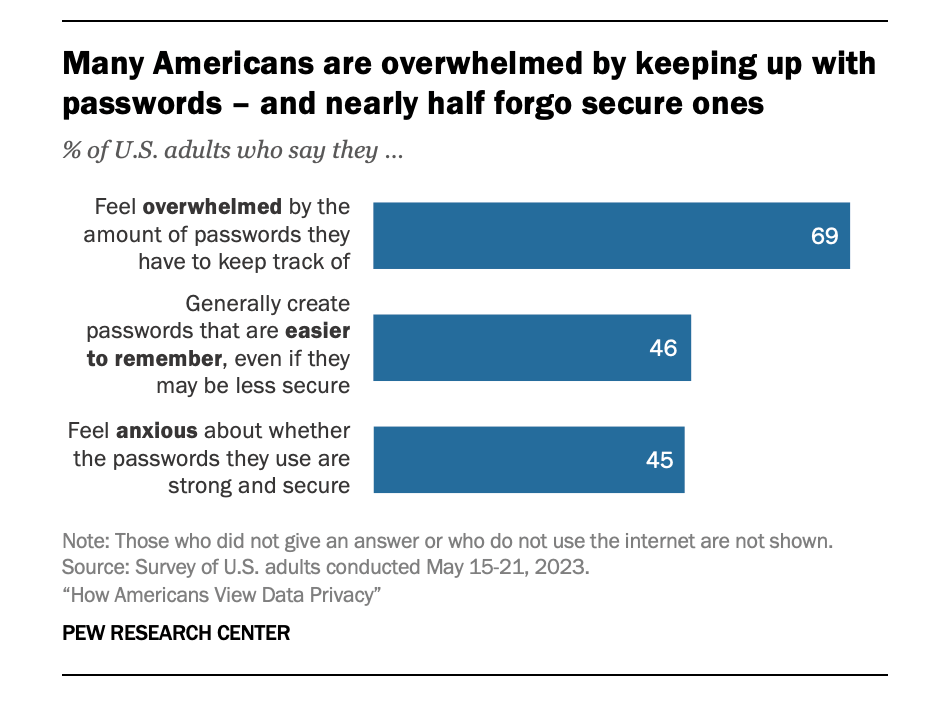When many private and public organizations handle so much of our PII from almost every aspect of life, concerns about data privacy are increasingly relevant. A recent report from the Pew Research Center sheds light on Americans’ growing unease with how their personal information is handled by both government and private sectors. This post explores the key findings of this report, highlighting the challenges and concerns surrounding data breaches and compromised credentials.
The Pew report highlights a significant shift in public sentiment regarding government handling of personal data. Approximately 71% of U.S. adults express concern over how their information is utilized by the government, marking an increase from 64% in 2019. This concern is shared among those across the political spectrum, signaling that this is a common point of concern among all Americans.
The skepticism extends to the corporate sphere, especially concerning the use of Artificial Intelligence. A striking 70% of those familiar with AI distrust companies to make responsible decisions regarding its application. Moreover, a vast majority fear that the information harvested by these corporations will be used in uncomfortable or unintended ways, despite 62% acknowledging that AI could potentially simplify life. This paradox highlights the complex relationship users have with technology—valuing its convenience but distrusting its implications.
An interesting aspect of the report discusses the perceived efficacy of individual actions toward data protection. While 78% trust their own judgment in protecting personal data, 61% doubt that their efforts are significantly impactful. Additionally, the prevalent habit of skipping over privacy policies, with 56% admitting to not reading them thoroughly, suggests a resignation to the inevitability of data exploitation rather than informed consent.
The burden of maintaining digital security is palpably felt in the realm of password management. About 70% of Americans are overwhelmed by the sheer number of passwords they need to remember, which often results in compromised security practices. Despite widespread anxiety about password strength, a significant portion of the population opts for convenience over security, underscoring a critical vulnerability that could lead to data breaches.

Key findings about Americans and data privacy.” Pew Research Center, Washington, D.C. Oct 18, 2023 https://www.pewresearch.org/short-reads/2023/10/18/key-findings-about-americans-and-data-privacy/
The issue of password reuse exacerbates the risk of data breaches considerably. Many users tend to reuse the same passwords across multiple websites for convenience, despite the security risks this behavior poses. When one site suffers a data breach, all accounts using the same credentials on other sites immediately become vulnerable. This domino effect can lead to multiple unauthorized accesses from a single compromised password, amplifying the potential damage.
“About seven-in-ten Americans are overwhelmed by the number of passwords they have to remember. And nearly half (45%) report feeling anxious about whether their passwords are strong and secure.
To combat this, monitoring for compromised credentials play a crucial role. These services scan databases of leaked credentials and alert users when their information appears in such databases. By being informed of breaches promptly, users can take immediate action to change their passwords before attackers exploit them on other sites. Moreover, many advanced security systems now incorporate proactive measures by automatically forcing password resets or temporarily locking accounts that are suspected of being compromised based on breach data.
This approach not only helps in quickly remediating security risks associated with breached passwords but also serves as a deterrent against the casual reuse of passwords. It emphasizes the importance of unique passwords for each site and educates users about the potential consequences of their security choices. In essence, monitoring for compromised credentials is a critical defensive strategy that strengthens the overall security posture by addressing the vulnerabilities introduced by password reuse, thus preventing further exploitation, and reducing the incidence of data breaches.
The report reveals that over the past year, 34% of Americans have experienced some form of data breach or hacking incident. Incidences range from fraudulent charges on cards to unauthorized access to email and social media accounts. The frequency of these breaches highlights the ongoing challenges in digital security and the pervasive impact of compromised credentials.
One of Pew Research Center’s earlier articles found that that Americans’ understanding of basic cybersecurity topics such as multi-factor authentication are limited. According to the study, a staggering 71% of respondents could not correctly identify an example of an MFA screen among a set of images, with only 10% answering correctly and the remaining 18% uncertain. This widespread lack of awareness about MFA functionalities is concerning, as it shows a large gap in the general public’s knowledge about basic security measures.
The effectiveness of MFA relies on user familiarity; if the average user can’t correctly identify an MFA interface, they’re susceptible to authenticating fraudulent MFA requests. This gap in understanding calls for a need to implement security protocols that don’t rely on MFA to protect account with compromised passwords.
Public trust in social media executives to responsibly manage user data is exceedingly low, with 77% expressing little to no confidence in these leaders. The call for accountability is echoed in the bipartisan support for more stringent regulations on data handling by companies, reflecting a widespread demand for greater protection of personal information.
One of the most unanimous concerns is the protection of children’s privacy online. Nearly 90% of Americans are worried about social media sites accessing personal information about children, with similar concerns about advertisers and online games. The consensus that parents and technology companies should bear significant responsibility for protecting children’s online privacy is a clear mandate from the public.
The findings from the Pew Research Center report are a clear indicator of the public’s increasing awareness and concern over data privacy. The report not only highlights the complexities of managing personal information in an era with AI but also reflects a growing demand for effective protections and responsible handling of data.
It’s important that both policymakers and technology firms take active steps to enhance user privacy through stricter regulations and improved practices. Tackling the widespread issue of password reuse by encouraging the use of unique, strong passwords for each account is critical. Moreover, given the substantial lack of awareness around multi-factor authentication, relying solely on MFA is insufficient.
Alongside this, we must strengthen security measures, including the monitoring of compromised credentials, and improve transparency around how data is used. Enhancing user controls is also essential. Together, these measures will help rebuild trust and create a more secure digital environment for everyone. It’s about protecting individual users and strengthening our collective digital defenses against the domino effects of data breaches.
AUTHOR
 Josh Parsons
Josh Parsons
Josh is the Product Marketing Manager at Enzoic, where he leads the development and execution of strategies to bring innovative threat intelligence solutions to market. Outside of work, he can be found at the nearest bookstore or exploring the city’s local coffee scene.